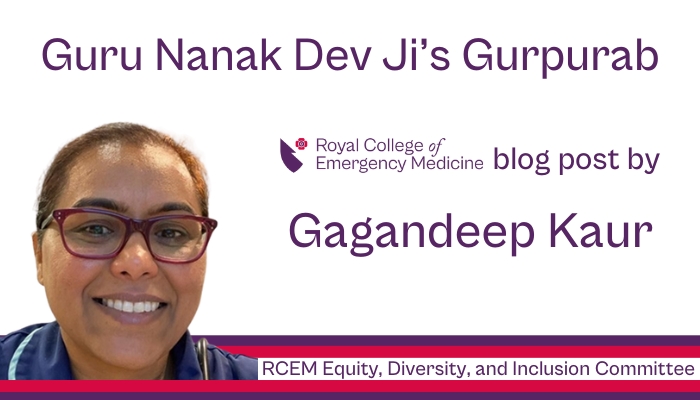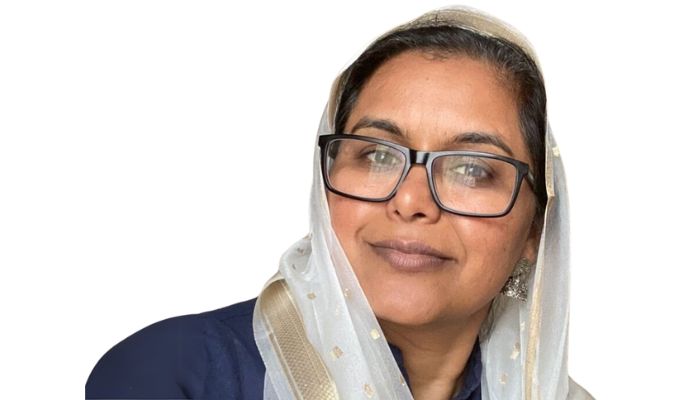RCEM EDI Committee: Guru Nanak Dev Ji’s Gurpurab
Tuesday 28 November 2023
This week saw a major festival celebrated by Sikhs across the world – the date of Guru Nanak Dev Ji’s Gurpurab (birth). To mark this, Gagandeep Kaur (pictured below), an Advanced Clinical Practitioner at Manchester University NHS Foundation Trust, explains the festival’s significance as a guest contributor with our Equity, Diversity and Inclusion Committee.

In November, there are two very important dates in the history of the Sikh religion.
On 24 November 2023 Sikhs across the world celebrated the Martyrdom of Guru Teg Bahadur Ji and on 27 November 2023 we celebrate Guru Nanak Dev Ji’s Birth (Gurpurab). Both celebrations highlight strong but different virtues of the Sikh faith.
Guru Nanak Dev Ji (‘Guru Nanak’), the founder of the Sikh faith, was born in Nankana Sahib, which was previously situated in Northern India but is now situated in Pakistan.
There has been controversy about Guru Nanak’s date of birth, however most Sikhs celebrate his birthday in the month of Katik (October-November). The precise date changes each year.
From a very young age, Guru Nanak revolted against established superstitious religious practices. He used logical reasoning to stand up against the customs practiced at that time.
It was during his stay in the Sultanpur, that Guru Nanak found enlightenment after a holy dip in the River Bein.
He disappeared for three days and returned with the message that ‘there is no Hindu, there is no Muslim’ – rejecting the notion of divisions between people based on their religion.
He dedicated his life to preaching this enlightened philosophy. His mission took him beyond India to various countries in South Asia and Middle East. He was accompanied by Bhai Mardana (a Muslim) in his mission.
The journeys of Guru Nanak are called the four Udasis. He spent almost 24 years of his life on these journeys that covered 24,000 km on foot.
His message was on the oneness of the creator and the fundamental brotherhood and sisterhood of all.
He stated that the essence of the divine dwelled within everyone and there was no difference between people based on caste, creed, gender or nationality.
He also stated that human life can become a profound experience of love, truth, patience, peace and contentment when lived in the awareness of the divine.
He condemned slavery and the caste system and promoted equality. He contributed towards the empowerment of women and non-discrimination in India.
He also stressed the importance of inner spiritual awakening through meditation.
His preaching was simple and had three major components: Naam Japna (meditation), Kirat Karna (honest earning) and Vand Chakana (sharing).
He eventually settled in Kartarpur Sahib and undertook community farming for about 17 years during the later periods of his life.
There were daily prayers which were followed by the langar (communal cooking and sharing of food).
He was respected and loved in society because of his liberal philosophy, humane outlook, and inclusive ideology. Guru Nanak passed away at the age of 70.
His death was recognised by Muslims, Sikhs and Hindus and key religious leaders throughout the world.
Guru Nanak’s teachings have profound relevance to our profession. Practicing Naam Japna (meditation) can help us during moments of personal reflection to improve our attitude, tolerance, and performance through practising mindfulness.
Kirat Karni (honest earning) encourages us to earn money through hard work and dedication thus reducing our dependence on the state.
Vand Chakana is a way to share our resources whether monetary or intellectual for the good of society, and Sewa is our commitment to selfless service to society.
The best dedication to Guru Nanak on this auspicious occasion is to adopt the wisdom and values taught by him.
For those of us who work in Emergency Medicine these are empathy, altruism, equality, tolerance and respect for others. Happy Guru Nanak Gurpurab!

